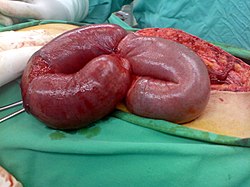Bowel infarction
(Redirected from Intestinal infarction)
Editor-In-Chief: Prab R Tumpati, MD
Obesity, Sleep & Internal medicine
Founder, WikiMD Wellnesspedia &
W8MD medical weight loss NYC and sleep center NYC
| Bowel infarction | |
|---|---|

| |
| Synonyms | N/A |
| Pronounce | N/A |
| Specialty | N/A |
| Symptoms | Severe abdominal pain, nausea, vomiting, diarrhea, fever, bloody stool |
| Complications | Sepsis, peritonitis, bowel perforation, multiple organ dysfunction syndrome |
| Onset | Sudden |
| Duration | Hours to days |
| Types | N/A |
| Causes | Mesenteric ischemia, volvulus, intussusception, strangulated hernia |
| Risks | Atherosclerosis, atrial fibrillation, heart failure, hypercoagulability |
| Diagnosis | CT scan, MRI, angiography, blood tests |
| Differential diagnosis | Gastroenteritis, appendicitis, diverticulitis, irritable bowel syndrome |
| Prevention | N/A |
| Treatment | Surgery, antibiotics, anticoagulation, intravenous fluids |
| Medication | N/A |
| Prognosis | Variable, depends on severity and promptness of treatment |
| Frequency | Rare |
| Deaths | N/A |
Bowel infarction, also known as intestinal infarction, is a serious medical condition characterized by the death of a segment of the intestine due to a lack of blood supply. This condition is considered a medical emergency and requires immediate attention to prevent severe complications or death. Bowel infarction can affect any part of the intestine, including the small intestine and the large intestine.
Causes
The primary cause of bowel infarction is a blockage in the arteries that supply blood to the intestines. This blockage can be due to various factors, including:
- Thrombosis: The formation of a blood clot within a blood vessel.
- Embolism: The sudden blocking of an artery by a clot or foreign material that has been brought to its site of lodgment by the blood current.
- Vasculitis: Inflammation of the blood vessels.
- Strangulated hernia: A hernia that cuts off blood supply to the intestine.
- Volvulus: Twisting of the intestine that causes obstruction.
- Intussusception: Telescoping of a segment of the intestine into another segment.
Symptoms
Symptoms of bowel infarction can vary but often include:
- Severe abdominal pain
- Nausea and vomiting
- Bloody stools
- Fever
- Rapid heartbeat
- Low blood pressure
- Abdominal distension
Diagnosis
Diagnosis of bowel infarction involves a combination of medical history, physical examination, and diagnostic tests, including:
- Blood tests: To check for signs of infection or inflammation.
- Imaging studies: Such as CT scan or MRI to visualize the intestines and identify blockages.
- Angiography: An imaging test to view blood vessels and check for blockages.
Treatment
Treatment for bowel infarction typically involves surgery to remove the dead segment of the intestine and restore blood flow. Other treatments may include:
- Antibiotics: To prevent or treat infection.
- IV fluids: To prevent dehydration and maintain blood pressure.
- Pain management: To relieve symptoms.
- Nutritional support: Including total parenteral nutrition (TPN) if the patient is unable to eat.
Complications
If not treated promptly, bowel infarction can lead to serious complications, including:
- Sepsis: A life-threatening response to infection.
- Peritonitis: Inflammation of the peritoneum, the lining of the abdominal cavity.
- Short bowel syndrome: A condition that occurs when a large portion of the small intestine is removed.
Prevention
Preventing bowel infarction involves managing risk factors and conditions that can lead to blood flow obstruction. This includes:
- Regular medical check-ups
- Managing chronic conditions such as diabetes and high blood pressure
- Avoiding smoking
- Maintaining a healthy diet and exercise routine
See Also
Transform your life with W8MD's budget GLP-1 injections from $125.
W8MD offers a medical weight loss program to lose weight in Philadelphia. Our physician-supervised medical weight loss provides:
- Most insurances accepted or discounted self-pay rates. We will obtain insurance prior authorizations if needed.
- Generic GLP1 weight loss injections from $125 for the starting dose.
- Also offer prescription weight loss medications including Phentermine, Qsymia, Diethylpropion, Contrave etc.
NYC weight loss doctor appointments
Start your NYC weight loss journey today at our NYC medical weight loss and Philadelphia medical weight loss clinics.
- Call 718-946-5500 to lose weight in NYC or for medical weight loss in Philadelphia 215-676-2334.
- Tags:NYC medical weight loss, Philadelphia lose weight Zepbound NYC, Budget GLP1 weight loss injections, Wegovy Philadelphia, Wegovy NYC, Philadelphia medical weight loss, Brookly weight loss and Wegovy NYC
|
WikiMD's Wellness Encyclopedia |
| Let Food Be Thy Medicine Medicine Thy Food - Hippocrates |
Medical Disclaimer: WikiMD is not a substitute for professional medical advice. The information on WikiMD is provided as an information resource only, may be incorrect, outdated or misleading, and is not to be used or relied on for any diagnostic or treatment purposes. Please consult your health care provider before making any healthcare decisions or for guidance about a specific medical condition. WikiMD expressly disclaims responsibility, and shall have no liability, for any damages, loss, injury, or liability whatsoever suffered as a result of your reliance on the information contained in this site. By visiting this site you agree to the foregoing terms and conditions, which may from time to time be changed or supplemented by WikiMD. If you do not agree to the foregoing terms and conditions, you should not enter or use this site. See full disclaimer.
Credits:Most images are courtesy of Wikimedia commons, and templates, categories Wikipedia, licensed under CC BY SA or similar.
Translate this page: - East Asian
中文,
日本,
한국어,
South Asian
हिन्दी,
தமிழ்,
తెలుగు,
Urdu,
ಕನ್ನಡ,
Southeast Asian
Indonesian,
Vietnamese,
Thai,
မြန်မာဘာသာ,
বাংলা
European
español,
Deutsch,
français,
Greek,
português do Brasil,
polski,
română,
русский,
Nederlands,
norsk,
svenska,
suomi,
Italian
Middle Eastern & African
عربى,
Turkish,
Persian,
Hebrew,
Afrikaans,
isiZulu,
Kiswahili,
Other
Bulgarian,
Hungarian,
Czech,
Swedish,
മലയാളം,
मराठी,
ਪੰਜਾਬੀ,
ગુજરાતી,
Portuguese,
Ukrainian
Contributors: Prab R. Tumpati, MD


